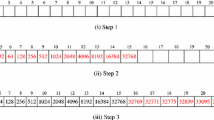Abstract
The addition chains with minimal length are the basic block to the optimal computation of finite field exponentiations. It has very important applications in the areas of error-correcting codes and cryptography. However, obtaining the shortest addition chains for a given exponent is a NP-hard problem. In this work we propose the adaptation of a Particle Swarm Optimization algorithm to deal with this problem. Our proposal is tested on several exponents whose addition chains are considered hard to find. We obtained very promising results.
Preview
Unable to display preview. Download preview PDF.
Similar content being viewed by others
References
Bergeron, F., Berstel, J., Brlek, S.: Efficient computation of addition chains. Journal de thorie des nombres de Bordeaux 6, 21–38 (1994)
Cruz-Cortés, N., Rodríguez-Henríquez, F., Coello, C.A.C.: An Artificial Immune System Heuristic for Generating Short Addition Chains. IEEE Transactions on Evolutionary Computation 12(1), 1–24 (2008)
Cruz-Cortés, N., Rodríguez-Henríquez, F., Coello Coello, C.A.: On the optimal computation of finite field exponentiation. In: Lemaître, C., Reyes, C.A., González, J.A. (eds.) IBERAMIA 2004. LNCS (LNAI), vol. 3315, pp. 747–756. Springer, Heidelberg (2004)
Cruz-Cortés, N., Rodríguez-Henríquez, F., Juárez-Morales, R., Coello Coello, C.A.: Finding Optimal Addition Chains Using a Genetic Algorithm Approach. In: Hao, Y., Liu, J., Wang, Y.-P., Cheung, Y.-m., Yin, H., Jiao, L., Ma, J., Jiao, Y.-C. (eds.) CIS 2005. LNCS (LNAI), vol. 3801, pp. 208–215. Springer, Heidelberg (2005)
Gordon, D.M.: A survey of fast exponentiation methods. Journal of Algorithms 27(1), 129–146 (1998)
IEEE P1363: Standard specifications for public-key cryptography, Draft Version D18. IEEE standards documents, http://grouper.ieee.org/groups/1363/ (November 2004)
Jarbouia, B., Cheikha, M., Siarryb, P., Rebaic, A.: Combinatorial particle swarm optimization (cpso) for partitional clustering problem. Applied Mathematics and Computation 192(2), 337–345 (2007)
Kennedy, J., Eberhart, R.: Particle swarm optimization. In: Proceedings IEEE International Conference on Neural Networks, pp. 1942–1948 (1995)
Knuth, D.E.: Art of Computer Programming, Seminumerical Algorithms, vol. 2. Addison-Wesley Professional, Reading (1997)
Koç, Ç.K.: High-Speed RSA Implementation. Technical Report TR 201, 71 pages, RSA Laboratories, Redwood City, CA (1994)
Koç, Ç.K.: Analysis of sliding window techniques for exponentiation. Computer and Mathematics with Applications 30(10), 17–24 (1995)
Koduru, P., Das, S., Welch, S.M.: Multi-objective hybrid pso using -fuzzy dominance. In: Proceedings of the 9th annual conference on Genetic And Evolutionary Computation Conference, pp. 853–860 (2007)
Kunihiro, N., Yamamoto, H.: New methods for generating short addition chains. IEICE Trans. Fundamentals E83-A(1), 60–67 (2000)
Menezes, A.J., van Oorschot, P.C., Vanstone, S.A.: Handbook of Applied Cryptography. CRC Press, Boca Raton (1996)
Poli, R., Kennedy, J., Blackwell, T.: Particle swarm optimization, an overview. Swarm Intelligence 1(1), 33–57 (2007)
Sierra, M.R., Coello Coello, C.A.: Improving pso-based multi-objective optimization using crowding, mutation and epsilon-dominance. In: Coello Coello, C.A., Hernández Aguirre, A., Zitzler, E. (eds.) EMO 2005. LNCS, vol. 3410, pp. 505–519. Springer, Heidelberg (2005)
Takagi, N., Yoshiki, J., Tagaki, K.: A fast algorithm for multiplicative inversion in GF(2m) using normal basis. IEEE Transactions on Computers 50(5), 394–398 (2001)
Author information
Authors and Affiliations
Editor information
Editors and Affiliations
Rights and permissions
Copyright information
© 2009 Springer-Verlag Berlin Heidelberg
About this paper
Cite this paper
León-Javier, A., Cruz-Cortés, N., Moreno-Armendáriz, M.A., Orantes-Jiménez, S. (2009). Finding Minimal Addition Chains with a Particle Swarm Optimization Algorithm. In: Aguirre, A.H., Borja, R.M., Garciá, C.A.R. (eds) MICAI 2009: Advances in Artificial Intelligence. MICAI 2009. Lecture Notes in Computer Science(), vol 5845. Springer, Berlin, Heidelberg. https://doi.org/10.1007/978-3-642-05258-3_60
Download citation
DOI: https://doi.org/10.1007/978-3-642-05258-3_60
Publisher Name: Springer, Berlin, Heidelberg
Print ISBN: 978-3-642-05257-6
Online ISBN: 978-3-642-05258-3
eBook Packages: Computer ScienceComputer Science (R0)




